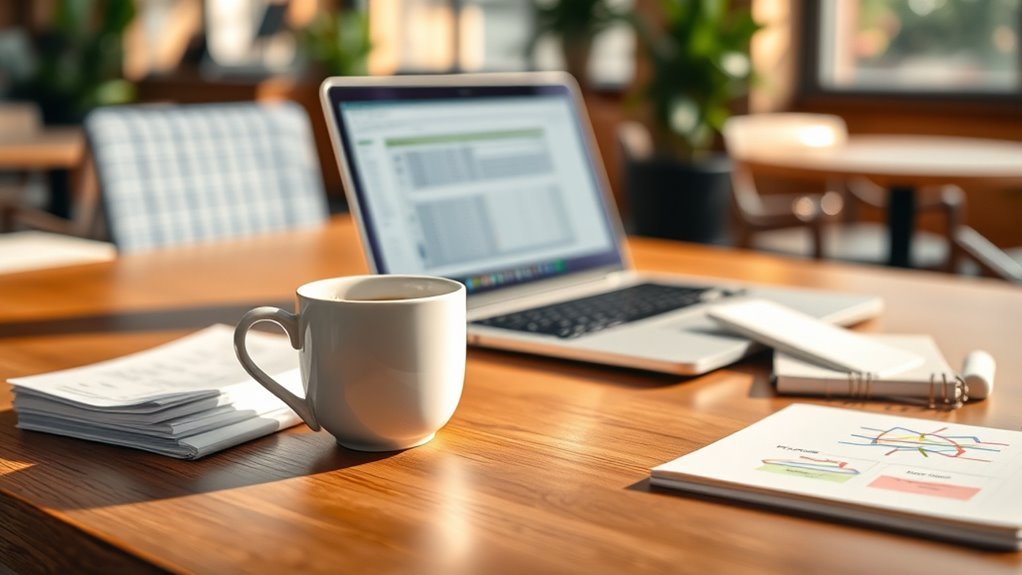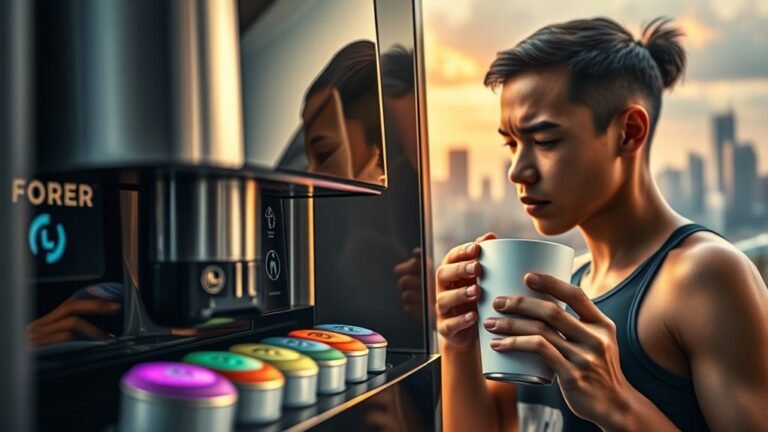Can I Write off Coffee as a Business Expense
You can write off coffee as a business expense if it’s directly related to your business activities. The IRS allows deductions for meals and snacks consumed for business purposes, but you need to document the expense clearly. Make sure to keep receipts and note the purpose, date, and attendees involved. Also, understand the difference between personal and business expenses to avoid confusion. There’s more to explore about maximizing your deductions effectively.
Understanding Business Expenses
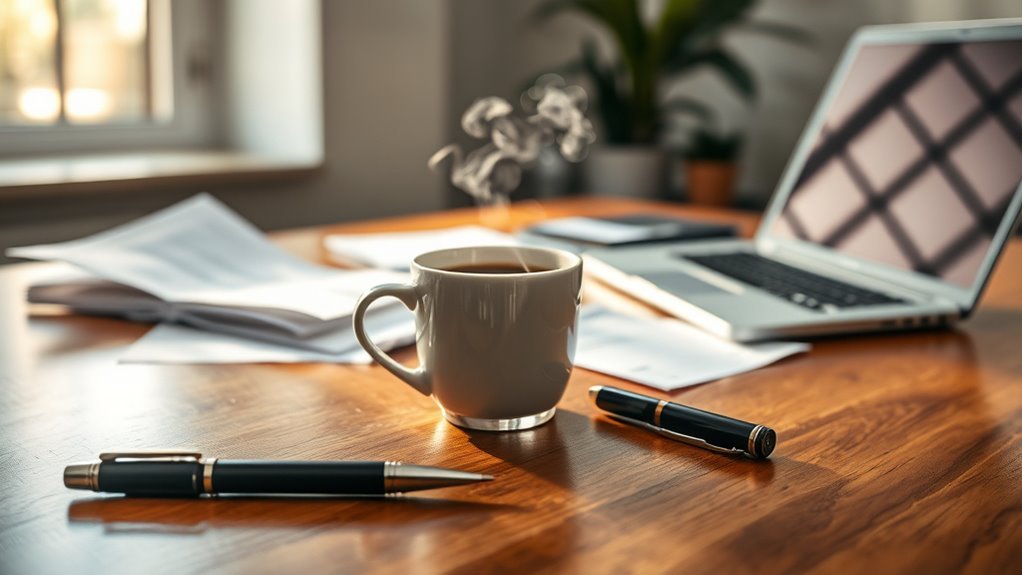
When you run a business, understanding what qualifies as a business expense is essential, as it directly impacts your tax deductions and overall financial health. Business expenses are costs incurred to generate income, and knowing which items are deductible can empower your financial strategy. Deductible items typically include supplies, equipment, and certain services necessary for operations. However, distinguishing between personal and business-related expenses is vital; only expenses directly tied to your business activities can be written off. This clarity not only optimizes your tax situation but also enhances your ability to reinvest in your business. By mastering the ins and outs of business expenses, you’re taking significant steps toward financial freedom and sustainability.
IRS Guidelines on Meals and Entertainment
When it comes to writing off meals and entertainment, understanding IRS guidelines is essential for ensuring compliance. You’ll need to know what qualifies as a business meal, the limits on deductions, and the necessary documentation to support your claims. By grasping these concepts, you can maximize your deductions while minimizing the risk of an audit.
Qualifying Business Meals
Although many business owners enjoy a good meal, understanding what qualifies as a business expense under IRS guidelines is crucial for maximizing deductions. When it comes to qualifying business meals, you need to verify they’re directly related to your business activities. For instance, if you’re discussing a project over coffee consumption with a client or potential partner, that expense may qualify. Similarly, meals consumed during business networking events can often be deducted. Remember that the IRS requires these meals to be ordinary and necessary for your business. Documenting the purpose of each meal and who was present can help substantiate your claims. By knowing these guidelines, you can confidently enjoy meals that can benefit your business financially.
Deduction Limits Explained
Understanding the deduction limits for meals and entertainment under IRS guidelines is fundamental for maximizing your business tax benefits. The IRS has established specific deduction thresholds that determine how much of your expenses can be written off. Generally, you can deduct 50% of qualifying meal expenses, but this can change based on the nature of the meal and the context in which it occurred. Proper expense categorization is important; distinguishing between personal and business meals can prevent costly errors during audits. Additionally, certain entertainment expenses may not be deductible at all, so it’s essential to stay informed about these limits to guarantee you’re capitalizing on every eligible deduction while maintaining compliance with IRS regulations.
Documentation Requirements Needed
To maximize your deductions for meals and entertainment, it’s not just about knowing the limits; proper documentation is key. You need to keep detailed records of your coffee expenses, including the types of coffee purchased, receipts, and the purpose of each expense. This documentation helps classify your expenses correctly into categories like client meetings or employee perks. The IRS expects this level of detail to validate your deductions. Additionally, note the date, location, and attendees for each coffee-related meeting. Having organized records not only supports your claims but also gives you the freedom to navigate your finances confidently. Remember, clear documentation can make a significant difference in defending your deductions.
What Qualifies as a Deductible Business Meal?
Determining what qualifies as a deductible business meal can be essential for maximizing your tax benefits. To guarantee your coffee expenses or meals are deductible, they must meet specific criteria. Here’s a quick breakdown:
| Criteria | Yes | No |
|---|---|---|
| Directly related to business | Meal discussed with a client | Personal gatherings |
| Necessary for business | Networking event | Family dinner |
| Ordinary and necessary | Common in your industry | Excessive or lavish meals |
The Difference Between Personal and Business Expenses
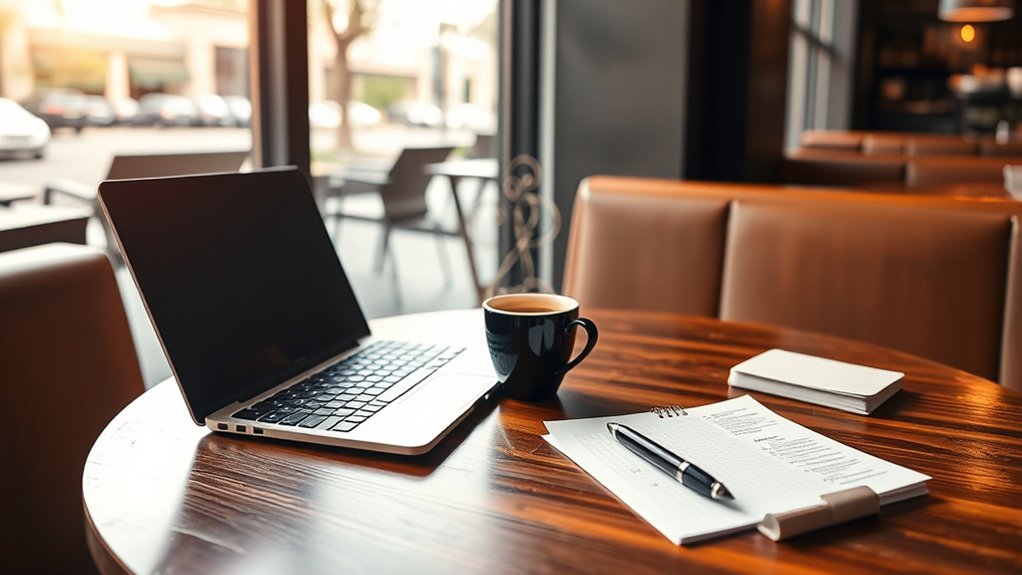
While it might seem straightforward, distinguishing between personal and business expenses is vital for effective financial management and tax compliance. Personal expenses are those incurred for your own enjoyment or daily living, like groceries and entertainment. In contrast, business expenses are necessary costs to operate your business, such as office supplies, travel, and client meals. When you mix the two, it complicates your financial picture and can lead to potential tax issues. To maintain clarity, always ask whether an expense directly supports your business activities. Keeping thorough records and receipts helps reinforce this distinction, ultimately granting you the freedom to make informed financial decisions without the risk of tax complications. Understanding this difference is essential for any entrepreneur.
Coffee as a Necessary Expense for Productivity
As you navigate the demands of running a business, recognizing coffee as a necessary expense for productivity can greatly impact your efficiency and overall work environment. The caffeine influence in coffee can boost alertness and enhance focus, making it a valuable tool in your daily operations.
Consider the following benefits:
- Increases concentration during long tasks
- Encourages team collaboration in informal settings
- Offers a quick energy boost during afternoon slumps
- Promotes a positive atmosphere conducive to creativity
- Supports networking opportunities over coffee meetings
Documenting Your Coffee Purchases
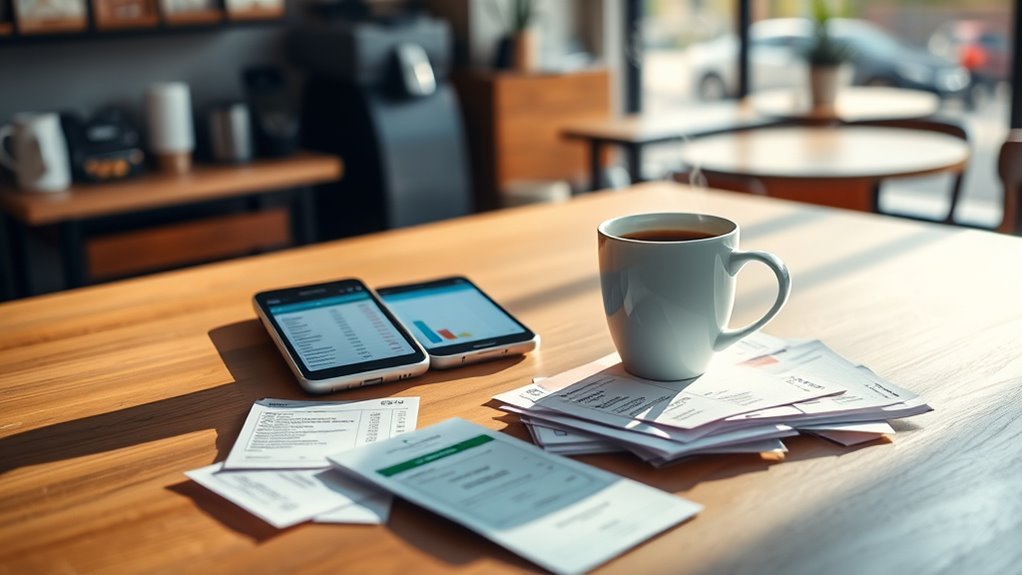
To effectively write off coffee as a business expense, you need to keep your receipts organized and easily accessible. Tracking your business usage is essential, as it provides the necessary documentation to support your claims. By maintaining accurate records, you can enhance your expense reporting and guarantee compliance with tax regulations.
Keep Receipts Organized
Maintaining an organized system for your coffee purchase receipts is essential for accurately documenting business expenses. Effective receipts management not only simplifies expense tracking but also safeguards your financial freedom. Here are some methods to keep your receipts organized:
- Use a dedicated folder, either digital or physical, for coffee receipts.
- Label each receipt with the date and purpose of the expense.
- Regularly review and categorize receipts to maintain clarity.
- Consider using expense tracking software for easy uploads.
- Set reminders to file receipts weekly to avoid backlog.
Track Business Usage
While enjoying a daily cup of coffee may seem like a personal indulgence, it’s crucial to track how much of that caffeine fix is tied to your business activities. To accurately document your coffee purchases, start by noting each transaction and categorizing them based on business use. Keep a log that records the date, amount spent, and purpose of the coffee consumption. If you often meet clients in coffee shops, make sure to specify these instances, as they can justify the expense. By maintaining detailed records, you not only enhance your ability to claim deductions but also guarantee compliance with tax regulations. Ultimately, tracking your coffee consumption helps you maximize potential tax benefits while enjoying your daily brew.
Common Misconceptions About Business Deductions
What do many business owners get wrong about deductions? Myth busting is essential for achieving expense clarity. Here are some common misconceptions that can lead to confusion:
- Deductions are only for large expenses.
- All meals are fully deductible.
- You can write off personal expenses if they’re vaguely related to business.
- Keeping receipts isn’t necessary for small purchases.
- Deductions only apply to traditional businesses.
Understanding these myths is important for maneuvering the complex world of business expenses. By dispelling these misunderstandings, you can make informed decisions about what qualifies as a deductible expense, ultimately allowing you to maximize your deductions without falling afoul of tax regulations. Embrace the freedom that clarity brings in managing your business finances!
Limits on Deductions for Meals
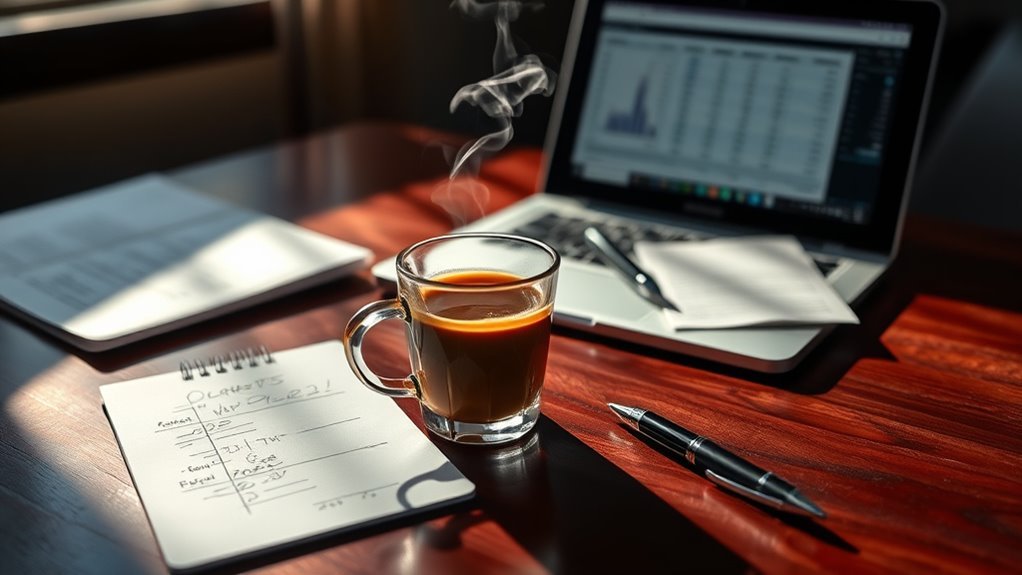
When considering meal deductions for your business, it’s important to recognize that there are specific limits imposed by the IRS. For most meals, you’re generally allowed to deduct 50% of the total expense, but this varies under certain conditions. For instance, if you’re entertaining clients, you might find that these meal limits can differ based on location or the nature of the expense. It’s vital to categorize these expenses correctly, as they fall under specific expense categories that the IRS monitors closely. Understanding these meal limits not only helps you stay compliant but also maximizes your potential deductions. So, always keep accurate records and be mindful of the rules to guarantee you’re making the most of your business expenses.
Tips for Maximizing Your Deductions
Understanding meal deductions is just one piece of the larger puzzle when it comes to maximizing your overall business expenses. To leverage your coffee budgets effectively, consider these tax strategies:
- Keep detailed records of all coffee-related expenses.
- Separate personal and business purchases to avoid confusion.
- Utilize a dedicated business account for coffee-related transactions.
- Stay updated on tax regulations affecting meal deductions.
- Consult a tax professional for tailored advice.
Frequently Asked Questions
Can I Deduct Coffee Purchased for Client Meetings?
Have you ever considered how client meeting etiquette impacts your expenses? When it comes to deducting coffee purchased for client meetings, you can often do so if it aligns with coffee expense guidelines. If the coffee’s purpose is to foster business relationships and not just a casual treat, it may qualify as a deductible expense. Just guarantee you keep proper records of these purchases to substantiate your claims come tax time.
How Do I Track Coffee Expenses Accurately?
To track coffee expenses accurately, start by implementing a reliable expense tracking system. Keep all coffee receipts organized, whether physical or digital, and categorize them by date and purpose. Consider using accounting software or apps that simplify this process, allowing you to input details easily. Regularly review your expenses to verify everything’s accounted for, which will not only help you stay organized but also give you the freedom to focus on your business growth.
Are There Specific Coffee Brands Eligible for Deductions?
When considering brand eligibility for coffee deductions, it’s important to note that specialty coffee may qualify if it directly supports your business activities. However, the IRS doesn’t specify particular brands; instead, it focuses on the purpose and nature of the expense. To maximize your deductions, make certain you’re keeping thorough records and that the coffee’s consumption is justifiable as a business necessity, thereby granting you the freedom to enjoy your brew while working.
Can I Write off Coffee Subscriptions as a Business Expense?
If you’re considering coffee subscriptions for your business, you might be wondering about their tax deduction eligibility. For example, a freelance graphic designer could benefit from a subscription to a premium coffee service to fuel creativity during long hours. By investing in coffee subscriptions, you not only enjoy the coffee but may also qualify for tax deduction benefits if the expense directly relates to your business activities. Always consult a tax professional for specific advice.
What if I Work From Home, Can I Deduct Coffee Costs?
If you work from home, you might be wondering about deducting coffee costs. While home office tax deductions can include expenses related to your workspace, coffee typically qualifies only if it’s directly tied to business activities. For instance, if you host clients or hold meetings at home, that coffee may be deductible. However, personal consumption usually isn’t. Always consult a tax professional to guarantee you’re making informed decisions about your specific situation.
